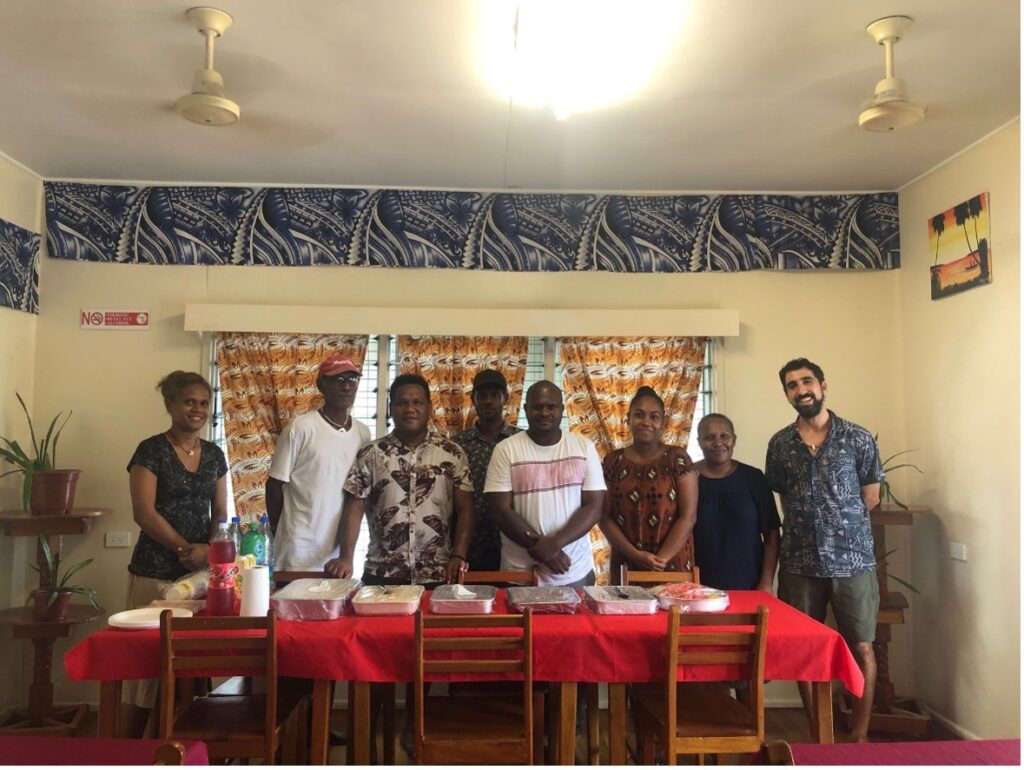

Co-developing lessons from livelihood investments in small-scale fisheries in the Solomon Islands
September 18, 2024
Our Student Awards are just one way we support and encourage the next generation of Australians into study, careers and volunteering in international agricultural research.
The awards are funded by our State and Territory Committees and made possible by organisations including ACIAR, international centres, Australian and overseas universities and NGOs who host our awardees.
It’s great to hear from our awardees after their return. Matthew Roscher from the University of Wollongong, is one of our 2023 cohort, and he recently travelled to the Solomon Islands for his research as part of an ACIAR (FIS/2019/124) funded project. He shares his experience below.

Matthew Roscher with workshop attendees in the Solomon Islands.
“My project, Co-developing lessons with research partners relating to potential trade-offs and rebound effects from livelihood investments in small-scale fisheries of Malaita Province, Solomon Islands, follows up research from 2023where I conducted a mixed-methods participatory research activity in nine coastal fishing communities of Langalanga Lagoon, Malaita Province, Solomon Islands,” said Matthew.
Securing a sustainable supply of nutritious aquatic foods is a point of emphasis in Pacific Island regional policy. To address this policy goal, numerous livelihoods projects have been implemented in the Pacific Island coastal fisheries sector to either enhance, diversify, or transform household livelihood activities. Commonly underpinning these livelihoods projects are objectives to reduce poverty and/or increase resource sustainability. However, projects often struggle to benefit people in the way they intend, and many result in a series of adverse trade-offs or unintended rebound effects where some project objectives are achieved at the expense of others. Despite the significant research and investments to support fish-based livelihoods, there is still limited knowledge of how livelihoods projects can improve the lives of people while also supporting sustainable fisheries.
In 2023, with the aid of two local research assistants, Matthew conducted 84 interviews with female and male fishers to explore how they would respond to hypothetical economic and environmental scenarios both within and outside of fisheries. The scenarios simulate potential changes resulting from projects aiming to either enhance existing livelihood activities or transform into alternative livelihood activities. Participants were asked how and why they would adapt their portfolio of livelihood activities in response to each scenario. The relationship between different indicators on these adaptations and explored potential trade-offs and rebound effects from them was also examined.
“I returned to Malaita this year to meet with the research team to discuss, validate, and interpret the main findings from the data. This involved convening a validation workshop which was attended by local research staff from the host institution (WorldFish), Malaita provincial fisheries officers, and representatives from local community-based organisations,” he explained
According to Matthew, the research was well-received by in-country partners.
“We had lively discussions on potential trade-offs and rebound effects from previous and ongoing fish-based livelihoods projects, as well as how they may be avoided while planning such investments. The sum of our discussions enabled a deeper understanding of the data, which ensures the findings are reflective of local contexts.”
Towards the end of the workshop, Matthew explained, they focused on co-developing key research learnings that encapsulate the big picture findings from this work:
- Understanding the fluidity of how people engage in different livelihood activities as opportunities and circumstances change is useful for planning investments at all scales.
- In addition to focusing on the potential benefits of livelihoods investments, it is also important to also discuss the potential risks. This can help address or mitigate adverse trade-offs during the project planning stage.
- Thinking through how time is spent, and the benefits families or communities receive from different activities is a useful way to talk about different or emerging livelihood opportunities.
- Recognizing the leading role women often take within village economies to support their households represents an important pathway to gender equality.
- Cultural practices have a big influence on how people adapt to change. The production of shell wealth is a daily exercise like collecting food, so the pressure on high-value shells is unlikely to decrease. Preserving this practice for the next generation relies on good resource management.
- There may be an opportunity to reduce the fishing pressure in coastal environments for reef species through investments and management policies that can help shift effort into offshore environments where there is comparatively less pressure.
“Through a better understanding of how livelihoods projects may impact ecosystems and people, efforts to support sustainable livelihoods within the Pacific Islands coastal fishery sector can be better positioned to benefit people in the way they intend,” said Matthew.
“Developing the information brief ensures the data is accessible to relevant stakeholders seeking to facilitate development or conservation through livelihoods projects to incorporate into their planning. Giving back this information to participating communities is a critical step to fostering future collaborations in these communities,” he said.
“The workshop also helped to strengthen the working partnership between several local and international institutions, including provincial government and non-governmental organisations. Some of the attendees are rising early career researchers who may soon be looking for higher degree opportunities. As a representative of NSW and from University of Wollongong, strengthening these relationships benefits my state by promoting the University which may lead to future partnerships, collaborations, and enrolments from interested students,” he concluded.


